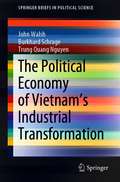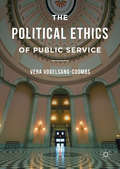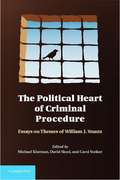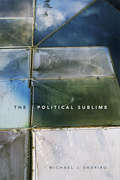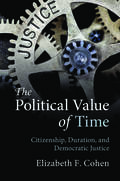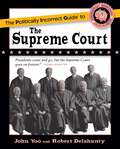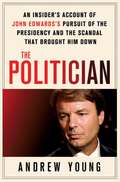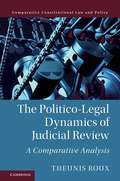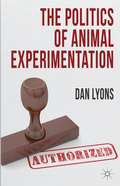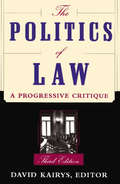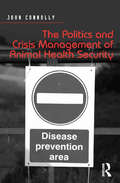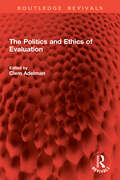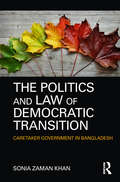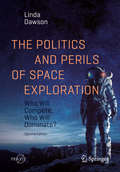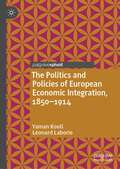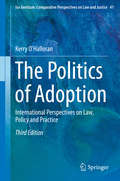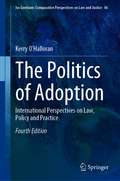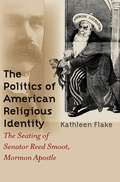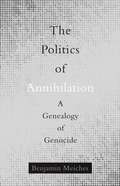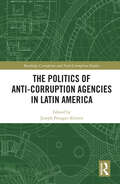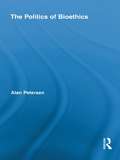- Table View
- List View
The Political Economy of Vietnam’s Industrial Transformation (SpringerBriefs in Political Science)
by John Walsh Burkhard Schrage Trung Quang NguyenThis book presents an overview of political economic change in Vietnam during a period of significant social and economic change and an era of international turbulence. It combines various political economic perspectives to offer an integrated and comprehensive review of Vietnam’s recent development, discussing topics such as public administrative reform, labour markets and special economic zones, environmental management and other important contemporary issues. This concise and highly readable book includes a considerable amount of research, and as such provides valuable insights for scholars and researchers interested in political economic change and in Vietnam.
The Political Economy of the American Frontier
by Ilia MurtazashviliThis book offers an analytical explanation for the origins of and change in property institutions on the American frontier during the nineteenth century. Its scope is interdisciplinary, integrating insights from political science, economics, law and history. This book shows how claim clubs - informal governments established by squatters in each of the major frontier sectors of agriculture, mining, logging and ranching - substituted for the state as a source of private property institutions and how they changed the course of who received a legal title, and for what price, throughout the nineteenth century. Unlike existing analytical studies of the frontier that emphasize one or two sectors, this book considers all major sectors, as well as the relationship between informal and formal property institutions, while also proposing a novel theory of emergence and change in property institutions that provides a framework to interpret the complicated history of land laws in the United States.
The Political Ethics of Public Service
by Vera Vogelsang-CoombsThis book provides a defense of democratic politics in American public service and offers the political ethics of public service as a realistic and optimistic alternative to the cynical American view toward politics and public service. The author's alternative helps career public servants regain public trust by exercising constitutionally centered moral and political leadership that balances the regime values of liberty and equality in governing American society while contributing to the ethical progress of the nation. She identifies three distinct leadership styles of political ethics, enabling career public servants to reconcile their personal loyalties, morality, and consciences with the public and private morality of American society and their constitutional obligations to secure the democratic freedoms of Americans. Recognizing career public servants' moral and institutional struggles, the book proposes a rigorous leadership development program to acclimate individuals to workplace psychological, moral, and political challenges. The view offered here is that career public servants must be a part of, rather than isolated from, American politics to be effective on the job.
The Political Heart of Criminal Procedure
by David Skeel Michael Klarman Carol SteikerThe past several decades have seen a renaissance in criminal procedure as a cutting-edge discipline and as one inseparably linked to substantive criminal law. This renaissance can be traced in no small part to the work of a single scholar: William Stuntz. This volume brings together twelve leading American criminal justice scholars whose own writings have been profoundly influenced by Stuntz and his work. Their contributions consist of essays on subjects ranging from the political economy of substantive criminal law to the law of police investigations to the role of religion in legal scholarship - all themes addressed by Stuntz in his own work. Some contributions directly analyze or respond to Stuntz's work, while others address topics or themes Stuntz wrote about from the contributor's own distinctive perspective.
The Political Roots of Racial Tracking in American Criminal Justice
by Nina M. MooreThe race problem in the American criminal justice system endures because of the enabling behavior of the public and of policy makers. The tendency of racial justice advocates to point the finger of blame chiefly at law enforcement, or racial conservatives, or the war on drugs, or any other single entity is misguided. Whether the problem is defined in terms of minority overrepresentation in the criminal justice system or in terms of the differential treatment minorities receive while entangled within the criminal process, a critical mass of citizens and policy makers that care enough to demand something be done about it is lacking. We Are "The Man" is the story of how racial concerns are consistently ignored in the national crime-policy process and why.
The Political Sublime (Thought in the Act)
by Michael J. ShapiroIn The Political Sublime Michael J. Shapiro formulates an original politics of aesthetics through an analysis of the experience of the sublime. Turning away from Kant's analysis of the sublime experience as a validation of the existence of a universal common sense, Shapiro draws on Deleuze, Lyotard, and Rancière to show how incomprehensible events and dilemmas provide openings for new political formations. He approaches the sublime through a range of artistic and cultural texts that address social crises and natural disasters, from the writing of James Baldwin and Ta-Nehisi Coates to the films of Ingmar Bergman and Spike Lee; these works suggest ways to channel the disruptive effects of the sublime into resistance to authority and innovative political initiative. Whether stemming from the threat of nuclear annihilation or the aftermath of an earthquake, the violence of racism and terrorism or the devastation of industrialism, sublime experience, Shapiro contends, allows for a rethinking of events in ways that reveal, redistribute, and create conditions of possibility for alternative communities of sense.
The Political Value of Time: Citizenship, Duration, and Democratic Justice
by Elizabeth F. CohenWaiting periods and deadlines are so ubiquitous that we often take them for granted. Yet they form a critical part of any democratic architecture. When a precise moment or amount of time is given political importance, we ought to understand why this is so. The Political Value of Time explores the idea of time within democratic theory and practice. Elizabeth F. Cohen demonstrates how political procedures use quantities of time to confer and deny citizenship rights. Using specific dates and deadlines, states carve boundaries around a citizenry. As time is assigned a form of political value it comes to be used to transact over rights. Cohen concludes with a normative analysis of the ways in which the devaluation of some people's political time constitutes a widely overlooked form of injustice. This book shows readers how and why they need to think about time if they want to understand politics.
The Politically Incorrect Guide to the Supreme Court (The Politically Incorrect Guides)
by John Yoo Robert J. DelahuntyJustice in the Balance Alexander Hamilton famously predicted that the judiciary would be "the least dangerous" branch of government. How's that working out? The Supreme Court stands as arbiter over a country increasingly unable to govern itself. Americans can't agree on the meaning of the Constitution or even the rule of law. Are the nine high priests enthroned in their marble temple the saviors of the Republic or the pallbearers of democracy? Are they defenders of the Constitution as written or super-legislators who make law from the bench? What did the Founders envision when they vested the "judicial Power" in "one supreme Court"? John Yoo, a professor of law at UC Berkeley, and Robert J. Delahunty, a fellow at the Claremont Institute Center for the American Way of Life, provide the answers with an incisive reading of the law and constitutional history. The Politically Incorrect Guide to the Supreme Court explains: The turbulent history of the court's early years, and the eventual triumph of "judicial supremacy" The Bill of Rights: how the Court has defined free speech, freedom of religion, and the right to bear arms The Court's notorious rulings and how they were overturned—from Dred Scott to Roe v. Wade Why "court-packing" is a constant temptation for Democratic presidents The Supreme Court's best and worst justices—and what qualities distinguished them The future of the Supreme Court: Will it be the rubber stamp of corrupt administrations or the ultimate watchdog protecting our nation's liberties? The Politically Incorrect Guide to the Supreme Court offers a penetrating and irreverent account of the justices—ideologues and cowards, geniuses and mediocrities, all of them thoroughly human—and a fascinating analysis of a Court that has swung like a pendulum from preserving the Republic to undermining government by the people and back to defending the Constitution. Sprightly, informative, and powerfully argued, this book is guaranteed to give the reader a deeper understanding of America's most powerful judicial body.
The Politician: An Insider's Account of John Edwards's Pursuit of the Presidency and the Scandal That Brought Him Down
by Andrew Young"The Politician" offers a look at the trajectory which made John Edwards the ideal Democratic candidate for president, and the hubris which brought him down, leaving his career, his marriage, and his dreams in ashes.
The Politicization of Safety: Critical Perspectives on Domestic Violence Responses (Families, Law, and Society #10)
by Jane K. StoeverA look at gun control, campus sexual assault, immigration, and more that considers the future of responses to domestic violence Domestic violence is commonly assumed to be a bipartisan, nonpolitical issue, with politicians of all stripes claiming to work to end family violence. Nevertheless, the Violence Against Women Act expired for over 500 days between 2012 and 2013 due to differences between the U.S. Senate and House, demonstrating that legal protections for domestic abuse survivors are both highly political and highly vulnerable. Racial and gender politics, the move toward criminalization, reproductive justice concerns, gun control debates, and political interests are increasingly shaping responses to domestic violence, demonstrating the need for greater consideration of the interplay of politics, domestic violence, and how the law works in people’s lives. The Politicization of Safety provides a critical historical perspective on domestic violence responses in the United States. It grapples with the ways in which child welfare systems and civil and criminal justice responses intersect, and considers the different, overlapping ways in which survivors of domestic abuse are forced to cope with institutionalized discrimination based on race, gender, sexual orientation, and immigration status. The book also examines movement politics and the feminist movement with respect to domestic violence policies. The tensions discussed in this book, similar to those involved in the #metoo movement, include questions of accountability, reckoning, redemption, healing, and forgiveness. What is the future of feminism and the movements against gender-based violence and domestic violence? Readers are invited to question assumptions about how society and the legal system respond to intimate partner violence and to challenge the domestic violence field to move beyond old paradigms and contend with larger justice issues.
The Politico-Legal Dynamics of Judicial Review: A Comparative Analysis (Comparative Constitutional Law and Policy)
by Theunis RouxComparative scholarship on judicial review has paid a lot of attention to the causal impact of politics on judicial decision-making. However, the slower-moving, macro-social process through which judicial review influences societal conceptions of the law/politics relation is less well understood. Drawing on the political science literature on institutional change, The Politico-Legal Dynamics of Judicial Review tests a typological theory of the evolution of judicial review regimes - complexes of legitimating ideas about the law/politics relation. The theory posits that such regimes tend to conform to one of four main types - democratic or authoritarian legalism, or democratic or authoritarian instrumentalism. Through case studies of Australia, India, and Zimbabwe and a comparative chapter analyzing ten additional societies, the book then explores how actually-existing judicial review regimes transition between these types. This process of ideational development, Roux concludes, is distinct both from the everyday business of constitutional politics and changes to the formal constitution.
The Politics Of Animal Experimentation
by Dan LyonsThe reality of animal experimentation and its regulation in Britain have been hidden behind a curtain of secrecy since its emergence as a political controversy in the 1870s. Public debate and political science alike have been severely hampered by a profound lack of reliable information about the practice. In this remarkable study, Dan Lyons advances and applies policy network analysis to investigate the evolution of British animal research policy-making.
The Politics Of Law: A Progressive Critique, Third Edition
by David KairysThe Politics of Law is the most widely read critique of the nature and role of the law in American society. This revised edition continues the book’s concrete focus on the major subjects and fields of law. New essays on emerging fields and the latest trends and cases have been added to updated versions of the now-classic essays from earlier editions. A unique assortment of leading scholars and practitioners in law and related disciplines-political science, economics, sociology, criminology, history, and literature-raise basic questions about law, challenging long-held ideals like the separation of law from politics, economics, religion, and culture. They address such issues contextually and with a keen historical perspective as they explain and critique the law in a broad range of areas. This third edition contains essays on all of the subjects covered in the first year of law school while continuing the book’s tradition of accessibility to non-law-trained readers. Insightful and powerful, The Politics of Law makes sense of the debates about judicial restraint and the range of legal controversies so central to American public life and culture.
The Politics and Crisis Management of Animal Health Security
by John ConnollyThe Politics and Crisis Management of Animal Health Security addresses the 2001 foot and mouth epidemic in the United Kingdom - one of, if not the, most significant crises ever to face the UK farming industry. Underpinned by interviews with politicians and bureaucrats and with significant primary documentary analysis the book shows that the crisis was a critical juncture in how disease outbreaks have been planned and managed ever since. The author explores how this event affected policy and governance arrangements for managing subsequent disease-induced threats (such as avian influenza and bovine TB) and concludes by considering the ’temporality’ of lesson learning by the UK government including the current and future challenges associated with managing incongruent risks (e.g., flood protection, swine flu and Ebola). This book provides students of public policy and administration with a significant illustration of how key concepts and analytical lenses from public policy can be applied to the study of the contours of practical policy change.
The Politics and Ethics of Evaluation (Routledge Revivals)
by Clem AdelmanFirst published in 1984, The Politics and Ethics of Evaluation considers, from the vantage point of the authors’ considerable experience of a wide range of evaluation, the ways in which they, and others, have coped with ethical and political problems that inherently arise during the evaluation process, particularly that of the responsive or democratic type. It looks at the evaluator’s claim to independence and how this is qualified by his relationship to his subject and to various other audiences.The ethical and political problems of evaluation are discussed from the different perspectives of moral philosophy, sociology, the politics of organisations, curriculum development, and institutional evaluation. Also included is a chapter detailing English law and legal judgements pertaining to qualified privilege, libel and defamation of character. Guidelines for conducting independent evaluation conclude the volume. This book will be of interest to students and researchers of higher education, curriculum studies and ethics.
The Politics and Law of Democratic Transition: Caretaker Government in Bangladesh
by Sonia Zaman KhanPeaceful legal and political ‘changing of the guards’ is taken for granted in developed democracies, but is not evident everywhere. As a relatively new democracy, marred by long periods of military rule, Bangladesh has been encountering serious problems because of a prevailing culture of mistrust, weak governance institutions, constant election manipulation and a peculiar socio-political history, which between 1990 and 2011 led to a unique form of transitional remedy in the form of an unelected neutral ‘caretaker covernment’ (CTG) during electoral transitions. This book provides a contextual analysis of the CTG mechanism including its inception, operation, manipulation by the government of the day and abrupt demise. It queries whether this constitutional provision, even if presently abolished after overseeing four acceptable general elections, actually remains a crucial tool to safeguard free and fair elections in Bangladesh. Given the backdrop of the culture of mistrust, the author examines whether holding national elections without a CTG, or an umpire of some kind, can settle the issue of credibility of a given government. The book portrays that even the management of elections is a matter of applying pluralist approaches. Considering the historical legacy and contemporary political trajectory of Bangladesh, the cause of deep-rooted mistrust is examined to better understand the rationale for the requirement, emergence and workings of the CTG structure. The book unveils that it is not only the lack of nation-building measures and governments’ wish to remain in power at any cost which lay behind the problems that Bangladesh faces today. Part of the problem is also the flawed logic of nation-building on the foundation of Western democratic norms which may be unsuitable in a South Asian cultural environment. Although democratic transitions, on the crutch of the CTG, have been useful in moments of crisis, its abolition creates the need for a new or revised transitional modality – perhaps akin to the CTG ethos – to oversee electoral governance, which will have to be renegotiated by the polity based on the people’s will. The book provides a valuable resource for researchers and academics working in the area of constitutional law, democratic transition, legal pluralism and election law.
The Politics and Perils of Space Exploration: Who Will Compete, Who Will Dominate? (Springer Praxis Books)
by Linda DawsonThis book examines the U.S. space program’s triumphs and failures in order to assess what constitutes a successful space policy. Using NASA and the space industry’s complex history as a guide, it draws global lessons about space missions and the trends we can expect from different nations in the next decade and beyond. Space exploration has become increasingly dependent on cooperation between countries as well as the involvement of private enterprise. This book thus addresses issues such as: Given their tenuous history, can rival countries work together? Can private enterprise fill NASA’s shoes and provide the same expertise and safety standards? Written by a former NASA Aerodynamics Officer at Houston Mission Control working on the Space Shuttle program, the second edition of this book provides updated information on U.S. space policy, including the new strategy to return to the Moon prior to traveling to Mars. Additionally, it takes a look at the formation of the Space Force as a military unit, as well as the latest developments in private industry. Overall, it is a thought-provoking resource for both space industry professionals and space enthusiasts.
The Politics and Policies of European Economic Integration, 1850–1914 (Palgrave Studies in Economic History)
by Yaman Kouli Léonard LaborieThis book asks anew whether there really was European integration before 1914. By focussing on quantitative (economic indicators) and qualitative data (the international regulation of patents, communication networks, social policy and plant protection), the authors re-evaluate European integration of the time and address the politics of seemingly apolitical cooperation. The authors show that European integration was multifaceted and cooperation less the result of intent, than of incentives. National polities and international regimes co-shaped each other. The result is a book that achieves two things: offer stand-alone chapters that shed light on specific developments and – these read altogether – develop a bigger picture. It will be of interest to researchers and students of economic history, as well as those interested in the history of internationalism and globalisation.
The Politics of Adoption
by Kerry O'HalloranThis book explains, compares and evaluates the social and legal functions of adoption within a range of selected jurisdictions and on an international basis. It updates and extends the second edition published by Springer in 2009. From a standpoint of the development of adoption in England & Wales and the changes currently taking place there, it considers the process as it has evolved in other countries. It identifies themes of commonality and difference in the experience of adoption in a common law context as compared and contrasted with that of other countries. It looks at adoption in France, Sweden and other civil law countries, as well as Japan and elsewhere in Asia, including a focus on Islamic adoption. It examines the experience of indigenous people in New Zealand and Australia, contrasting the highly regulated legal process of modern western society with the traditional practice of indigenous communities such as the Maori. A new chapter studies adoption in China. The book uses the international Conventions and associated ECtHR case law to benchmark developments in national law, policy and practice and to facilitate a cross-cultural comparative analysis.
The Politics of Adoption: International Perspectives on Law, Policy and Practice (Ius Gentium: Comparative Perspectives on Law and Justice #86)
by Kerry O’HalloranThis book, which updates and expands the third edition published by Springer in 2015, explains, compares and evaluates the social and legal functions of adoption within a range of selected jurisdictions and on an international basis. From the standpoint of the development of adoption in England & Wales, and the changes currently taking place there, it considers the process as it has evolved in other countries. It also identifies themes of commonality and difference in the experience of adoption in a common law context, comparing and contrasting this with the experience under civil law and in Islamic countries and with that of indigenous people. This book includes new chapters examining adoption in Russia, Korea and Romania. Further, it uses the international conventions and the associated ECtHR case law to benchmark developments in national law, policy and practice and to facilitate a cross-cultural comparative analysis.
The Politics of American Religious Identity
by Kathleen FlakeBetween 1901 and 1907, a broad coalition of Protestant churches sought to expel newly elected Reed Smoot from the Senate, arguing that as an apostle in the Church of Jesus Christ of Latter-day Saints, Smoot was a lawbreaker and therefore unfit to be a lawmaker. The resulting Senate investigative hearing featured testimony on every peculiarity of Mormonism, especially its polygamous family structure. The Smoot hearing ultimately mediated a compromise between Progressive Era Protestantism and Mormonism and resolved the nation's long-standing "Mormon Problem." On a broader scale, Kathleen Flake shows how this landmark hearing provided the occasion for the country--through its elected representatives, the daily press, citizen petitions, and social reform activism--to reconsider the scope of religious free exercise in the new century.Flake contends that the Smoot hearing was the forge in which the Latter-day Saints, the Protestants, and the Senate hammered out a model for church-state relations, shaping for a new generation of non-Protestant and non-Christian Americans what it meant to be free and religious. In addition, she discusses the Latter-day Saints' use of narrative and collective memory to retain their religious identity even as they changed to meet the nation's demands.
The Politics of Annihilation: A Genealogy of Genocide
by Benjamin MeichesHow did a powerful concept in international justice evolve into an inequitable response to mass suffering?For a term coined just seventy-five years ago, genocide has become a remarkably potent idea. But has it transformed from a truly novel vision for international justice into a conservative, even inaccessible term? The Politics of Annihilation traces how the concept of genocide came to acquire such significance on the global political stage. In doing so, it reveals how the concept has been politically contested and refashioned over time. It explores how these shifts implicitly impact what forms of mass violence are considered genocide and what forms are not. Benjamin Meiches argues that the limited conception of genocide, often rigidly understood as mass killing rooted in ethno-religious identity, has created legal and political institutions that do not adequately respond to the diversity of mass violence. In his insistence on the concept&’s complexity, he does not undermine the need for clear condemnations of such violence. But neither does he allow genocide to become a static or timeless notion. Meiches argues that the discourse on genocide has implicitly excluded many forms of violence from popular attention including cases ranging from contemporary Botswana and the Democratic Republic of Congo, to the legacies of colonial politics in Haiti, Canada, and elsewhere, to the effects of climate change on small island nations. By mapping the multiplicity of forces that entangle the concept in larger assemblages of power, The Politics of Annihilation gives us a new understanding of how the language of genocide impacts contemporary political life, especially as a means of protesting the social conditions that produce mass violence.
The Politics of Anti-Corruption Agencies in Latin America (Routledge Corruption and Anti-Corruption Studies)
by Joseph Pozsgai-AlvarezThis book investigates the history, development, and current state of anti-corruption agencies in Latin America. In recent decades, specialized anti-corruption agencies have sprung up as countries seek to respond to corruption and to counter administrative and political challenges. However, the characteristics, resources, power, and performance of these agencies reflect the political and economic environment in which they operate. This book draws on a range of case studies from across Latin America, considering both national anti-corruption bodies and agencies created and administered by, or in close coordination with, international organizations. Together, these stories demonstrate the importance of the political will of reformers, the private interests of key actors, the organizational space of other agencies, the position of advocacy groups, and the level of support from the public at large. This book will be a key resource for researchers across political science, corruption studies, development, and Latin American Studies. It will also be a valuable guide for policy makers and professionals in NGOs and international organizations working on anti-corruption advocacy and policy advice.
The Politics of Bioethics (Routledge Studies in Science, Technology and Society)
by Alan PetersenRecent rapid advances in the biosciences have led to considerable debate about the social, ethical, and legal implications of research and its applications. The mapping of the human genome, advances in cloning techniques, the harvesting of embryonic stem cells for research, increasing use of genetic testing in healthcare, and the development of large-scale genetic databases have not only generated high expectations about new diagnostics and treatments but also considerable widespread fear about their consequences. This book offers a critical appraisal of bioethics and its implications as it pertains to the fields of health and medicine and public health, with a particular emphasis on recent technological innovations as they provide a noteworthy exemplar of the power of bioethics in shaping policies, practices and notions of societal benefits. Whereas other books have tended to examine ethical dilemmas and challenges of applying ethical principles, often in relation to a limited array of issues, this book investigates the socio-political implications of bioethics discourse and practices in relation to a range of controversial (or potentially controversial) developments. Providing a benchmark for future debate and scholarly work, this volume will be of interest to policymakers, clinicians, scholars, and others who are looking for new ways of making sense and evaluating recent developments in the field of bioethics.
The Politics of Blood
by Anne-Maree FarrellHow best to manage risk involving multi-valued human biological materials is the overarching theme of this book, which draws on the sourcing and supply of blood as a case study. Blood has ethical, social, scientific and commercial value. This multi-valuing process presents challenges in terms of managing risk, therefore making it ultimately a matter for political responsibility. This is highlighted through an examination of the circumstances that led to HIV blood contamination episodes in the US, England and France, as well as their consequences. The roles of scientific expertise and innovation in managing risks to the blood system are also analysed, as is the increased use of precautionary and legal strategies in the post-HIV blood contamination era. Finally, consideration is given to a range of policy and legal strategies that should underpin effective risk governance involving multi-valued human biological materials.
